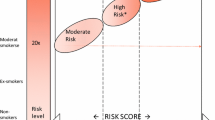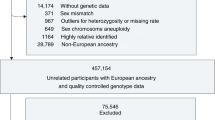Abstract
Smoking increases the risk of developing lung cancer. Genetic loci have been identified which could form the basis of a lung cancer susceptibility test; but little is known whether such a test would interest or motivate those trying to quit smoking. To address this, we investigated the attitudes of people trying to quit smoking towards genetic susceptibility testing for lung cancer. Participant’s attitudes to topics associated with lung cancer susceptibility testing were assessed; were they interested in genetic testing? What impact would a hypothetical high- or low- risk result have on smoking cessation? 680 self-completion questionnaires were given to individuals attending National Health Service stop smoking clinics in three different areas of the United Kingdom between 2011 and 2012. 139 questionnaires were returned, giving a 20 % response rate. Participants expressed an interest in a genetic susceptibility test for lung cancer and almost all reported that a high-risk result would increase their motivation to stop smoking. However, many participants had a neutral attitude towards a low-risk result. Most participants agreed their smoking habit could lead to lung cancer. Lung cancer susceptibility testing may be a useful incentive to help people quit smoking. This study suggests the need for genetic services to work with smoking cessation teams if routine testing becomes available in the future.

Similar content being viewed by others
References
Amos, C. I., Spitz, M. R., & Cinciripini, P. (2010). Chipping away at the genetics of smoking behavior. Nature Genetics, 42(5), 366–368.
Audrain, J., Boyd, N., Roth, J., Main, D., Caporaso, N., & Lerman, C. (1997). Genetic susceptibility testing in smoking-cessation treatment: one-year outcomes of a randomized trial. Addictive Behaviors, 22(6), 741–751.
Bierut, L. J., Madden, P. A. F., Breslau, N., Johnson, E. O., Hatsukami, D., & Pomerleau, D. (2007). Novel genes identified in a high-density genome wide association study for nicotine dependence. Human Molecular Genetics, 16(1), 24–35.
Brennan, P., Hainaut, P., & Boffetta, P. (2011). Genetics of lung-cancer susceptibility. Lancet Oncology, 12(4), 399–408.
Broderick, P., Wang, Y., Vijayakrishnan, J., Matakidou, A., Spitz, M., Eisen, T., et al. (2009). Deciphering the impact of common genetic variation on lung cancer risk: a genome-wide association study. Cancer Research, 69(16), 6633–6641.
Cummings, K. M., & Hyland, A. (2005). Impact of nicotine replacement therapy on smoking behavior. Annual Review of Public Health, 26, 583–599.
Dillard, A. J., McCaul, K. D., & Klein, W. M. P. (2006). Unrealistic optimism in smokers: Implications for smoking myth endorsement and self-protective motivation. Journal of Health Communication, 11, 93–102.
Docherty, S. L., McBride, C. M., Sanderson, S. C., O'Neill, S. C., Shepperd, J. A., & Lipkus, I. M. (2011). Young smokers' views of genetic susceptibility testing for lung cancer risk: minding unintended consequences. Journal of Community Genetics, 2(3), 165–172.
EU Council. (2001). Directive 2001/37/EC of the European Parliament and of the Council. L19426-19434.
Evans, C. (2006). Genetic Counselling: a psychological approach: Cambridge University Press.
Ferlay, J., Shin, H.-R., Bray, F., Forman, D., Mathers, C., & Parkin, D. M. (2010). Estimates of worldwide burden of cancer in 2008: GLOBOCAN 2008. International Journal of Cancer, 127(12), 2893–2917.
Halpern-Felsher, B. L., Biehl, M., Kropp, R. Y., & Rubinstein, M. L. (2004). Perceived risks and benefits of smoking: differences among adolescents with different smoking experiences and intentions. Preventive Medicine, 39(3), 559–567.
Hishida, A., Terazawa, T., Mamiya, T., Ito, H., Matsuo, K., Tajima, K., & Hamajima, N. (2010). Efficacy of genotype notification to Japanese smokers on smoking cessation–an intervention study at workplace. Cancer Epidemiology, 34(1), 96–100.
Her Majesty's Government. (2011). Healthy Lives, Healthy People: a Tobacco Control Plan for England. https://www.gov.uk/government/uploads/system/uploads/attachment_data/file/213757/dh_124960.pdf: Crown.
Hung, R., McKay, J., Gaborieau, V., Boffetta, P., Hashibe, M., Zaridze, D., et al. (2008). A susceptibility locus for lung cancer maps to nicotinic acetylcholine receptor subunit genes on 15q25. Nature, 452(7187), 633–637.
Ito, H., Matsuo, K., Wakai, K., Saito, T., Kumimoto, H., Okuma, K., et al. (2006). An intervention study of smoking cessation with feedback on genetic cancer susceptibility in Japan. Preventive Medicine, 42(2), 102–108.
Jarvis, M. J. (2004). Why people smoke. BMJ, 328(7434), 277–279.
Landi, M. T., Chatterjee, N., Yu, K., Goldin, L. R., Goldstein, A. M., Rotunno, M., et al. (2009). A genome-wide association study of lung cancer identifies a region of chromosome 5p15 associated with risk for adenocarcinoma. American Journal of Human Genetics, 85(5), 679–691.
Lerman, C., Gold, K., Audrain, J., Lin, T. H., Boyd, N. R., Orleans, C. T., et al. (1997). Incorporating biomarkers of exposure and genetic susceptibility into smoking cessation treatment: effects on smoking-related cognitions, emotions, and behavior change. Health Psychology, 16(1), 87–99.
Leventhal H, B. Y., Brownlee S. (1997). Illness representation: Theoretical foundations. In Perceptions of Health and Illness. Harwood Publishers: London.
Lipkus, I. M., McBride, C. M., Pollak, K. I., Lyna, P., & Bepler, G. (2004). Interpretation of genetic risk feedback among African american smokers with low socioeconomic status. Health Psychology, 23(2), 178–188.
Liu, J., Tozzi, F., Waterworth, D., Pillai, S., Muglia, P., Middleton, L., et al. (2010). Meta-analysis and imputation refines the association of 15q25 with smoking quantity. Nature Genet, 42(5), 436–440.
Marteau, T. M., French, D. P., Griffin, S. J., Prevost, A. T., Sutton, S., Watkinson, C., et al. (2010). Effects of communicating DNA-based disease risk estimates on risk-reducing behaviours. Cochrane Database of Systematic Reviews(10).
Mazanov, J., & Byrne, D. (2007). Changes in adolescent smoking behaviour and knowledge of health consequences of smoking. Australian Journal of Psychology (Vol. 59), 176–180.
McBride, C., Lipkus, I., Jolly, D., & Lyna, P. (2005). Interest in testing for genetic susceptibility to lung cancer among black college students "at risk" of becoming cigarette smokers. Cancer Epidemiology, Biomarkers & Prevention, 14(12), 2978–2981.
McBride, C. M., Bepler, G., Lipkus, I. M., Lyna, P., Samsa, G., Albright, J., et al. (2002). Incorporating genetic susceptibility feedback into a smoking cessation program for African-american smokers with low income. Cancer Epidemiology, Biomarkers & Prevention, 11(6), 521–528.
McBride, C. M., Koehly, L. M., Sanderson, S. C., & Kaphingst, K. A. (2010). The behavioral response to personalized genetic information: will genetic risk profiles motivate individuals and families to choose more healthful behaviors? Annual Review of Public Health, 31, 89–103.
McKay, J., Hung, R., Gaborieau, V., Boffetta, P., Chabrier, A., Byrnes, G., et al. (2008). Lung cancer susceptibility locus at 5p15.33. Nature Genet, 40(12), 1404–1406.
Office of National Statistics. (2011). General Lifestyle Survey: Smoking and drinking among adults, 2009.
O'Neill, S., White, D., Sanderson, S., Lipkus, I., Bepler, G., Bastian, L., & McBride, C. (2008). The feasibility of online genetic testing for lung cancer susceptibility: uptake of a web-based protocol and decision outcomes. Genetics in Medicine, 10(2), 121–130.
Parkin, D., Bray, F., Ferlay, J., & Pisani, P. (2005). Global cancer statistics 2002. CA: a Cancer Journal for Clinicians, 55, 74–108.
Peretti-Watel, P., & Constance, J. (2009). How do poor smokers justify smoking and what do they think about preventions? Deviance Et Societe, 33(2), 205–219.
Peto, R., Lopez, A., Boreham, J., Thun, M., & Heath, J. C. (1994). Mortality from Smoking in Developed Countries 1950–2000. Oxford University Press
Prochisca, J., & Velicer, W. (1997). The transtheoretical model of health behaviour change. American Journal of Health Promotion, 12(1), 38–48.
Ritchie, D., Amos, A., & Martin, C. (2010). "But it just has that sort of feel about it, a leper"–stigma, smoke-free legislation and public health. Nicotine & Tobacco Research, 12(6), 622–629.
Sanderson, S., O'Neill, S., White, D., Bepler, G., Bastian, L., Lipkus, I., & McBride, C. (2009). Responses to online GSTM1 genetic test results among smokers related to patients with lung cancer: a pilot study. Cancer Epidemiology, Biomarkers & Prevention, 18(7), 1953–1961.
Sanderson, S. C., Waller, J., Humphries, S. E., & Wardle, J. (2011). Public aware new of genetic influence on chronic disease risk; are genetic and lifestyle causal beliefs compatable? Public Health Genomics, 14(4–5), 290–297.
Sanderson, S. C., Wardle, J., Jarvis, M. J., & Humphries, S. E. (2004). Public interest in genetic testing for susceptibility to heart disease and cancer: a population-based survey in the UK. Preventive Medicine, 39(3), 458–464.
Schneider, F., Gruman, J., & Coutts, L. (2005). Applied social psychology: understanding and addressing social and practical problems: Sage.
Schwartz, A., Cote, M., Wenzlaff, A., Land, S., & Amos, C. (2009). Racial differences in the association between SNPs on 15q25.1, smoking behavior, and risk of non-small cell lung cancer. Journal of Thoracic Oncology, 4(10), 1195–1201.
Siahpush, M., McNeill, A., Hammond, D., & Fong, G. T. (2006). Socioeconomic and country variations in knowledge of health risks of tobacco smoking and toxic constituents of smoke: results from the 2002 International Tobacco Control (ITC) Four Country Survey. Tob Control, 15 Suppl 3, iii65-70.
Stuber, J., Galea, S., & Link, B. G. (2008). Smoking and the emergence of a stigmatized social status. Social Science & Medicine, 67(3), 420–430.
Taylor, K. L., Cox, L. S., Zincke, N., Mehta, L., McGuire, C., & Gelmann, E. (2007). Lung cancer screening as a teachable moment for smoking cessation. Lung Cancer, 56(1), 125–134.
Thirlaway, K. J., & Heggs, D. A. (2005). Interpreting risk messages: Women's responses to a health story. Health Risk & Society, 7(2), 107–121.
Thorgeirsson, T. E., Gudbjartsson, D. F., Surakka, I., Vink, J. M., Amin, N., Geller, F., et al. (2010). Sequence variants at CHRNB3-CHRNA6 and CYP2A6 affect smoking behavior. Nature Genetics, 42(5), 448–U135.
Tobacco and Genetics Consortium. (2010). Genome-wide meta-analyses identify multiple loci associated with smoking behavior. Nature Genetics, 42(5), 441–447.
Walker, M. S., Larsen, R. J., Zona, D. M., Govindan, R., & Fisher, E. B. (2004). Smoking urges and relapse among lung cancer patients: findings from a preliminary retrospective study. Preventive Medicine, 39(3), 449–457.
Wang, Y., Broderick, P., Matakidou, A., Eisen, T., & Houlston, R. (2010). Role of 5p15.33 (TERT-CLPTM1L), 6p21.33 and 15q25.1 (CHRNA5-CHRNA3) variation and lung cancer risk in never-smokers. Carcinogenesis, 31(2), 234–238.
Wang, Y., Broderick, P., Webb, E., Wu, X., Vijayakrishnan, J., Matakidou, A., et al. (2008). Common 5p15.33 and 6p21.33 variants influence lung cancer risk. Nature Genetics, 40(12), 1407–1409.
Weinstein, N. D., Marcus, S. E., & Moser, R. P. (2005). Smokers' unrealistic optimism about their risk. Tobacco Control, 14(1), 55–59.
West, R., & Sohal, T. (2006). "Catastrophic" pathways to smoking cessation: findings from national survey. BMJ, 332(7539), 458–460.
Acknowledgments
We would like to thank Dr Marion McAllister and Prof. Angus Clarke from Cardiff University for their advice and support in gaining ethical approval. We thank the Smoking Cessation Teams based at Cardiff, Newcastle-upon-Tyne and Middlesbrough for their support and enthusiasm in recruiting participants to this study, with particular thanks to Mrs Karen Heslop (Royal Victoria Infirmary, Newcastle), Ms Helen Poole & Dr Ramsey Sabit (University Hospital of Wales, Cardiff), and Mrs Gillian McIlhinney (James Cook University Hospital, Middlesbrough). We would finally like to thank the participants who completed and returned the questionnaires.
Conflict of Interest Statement
TK, AKF and KT declare that they have no conflict of interest.
All procedures followed were in accordance with the ethical standards of the responsible ommittee on human experimentation (institutional and national) and with the Helsinki Declaration of 1975, as revised in 2000.
Author information
Authors and Affiliations
Corresponding author
Rights and permissions
About this article
Cite this article
Kammin, T., Fenton, A.K. & Thirlaway, K. A Genetic Lung Cancer Susceptibility Test may have a Positive Effect on Smoking Cessation. J Genet Counsel 24, 522–531 (2015). https://doi.org/10.1007/s10897-014-9766-8
Received:
Accepted:
Published:
Issue Date:
DOI: https://doi.org/10.1007/s10897-014-9766-8




